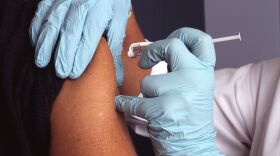The Michigan Department of Health and Human Services will receive a $1.66 million federal grant to help fund the Michigan Pediatric Epilepsy Project. The four-year grant from the Health Resources and Services Administration will provide about $416,000 each year to the project, which provides comprehensive care to children with epilepsy in Michigan. The grant is focused in particular on improving health outcomes for pediatric epilepsy patients in rural and underserved areas.
Marcia Franks is the project coordinator for the Michigan Pediatric Epilepsy Project. She says one of the biggest obstacles to treating rural patients is their distance from their specialists.
“The epilepsy centers are located, typically, in economic or urban settings, and so that's how we can help them connect with the families and patients that are in rural areas, is through telemedicine. So we're looking to expand that and create easier access for those families that live hours away from their specialist.”
She says that’s not what all patients need - in fact, she says, “some patients can be managed really well by their primary care providers.” But some patients struggle - “they continue to have seizures” - and so need to go to a higher-level specialty center where the physicians have more experience treating kids with complex epilepsy. Those who can’t, benefit from the tele-health services the project provides.
Franks says that the project is partnered with four major epilepsy centers in Michigan: Beaumont Children’s Hospital, Children’s Hospital of Michigan, Helen DeVos Children’s Hospital, and Mercy Health Hauenstein Neurosciences.
Franks says a problem not a lot of people are aware of is the transition from pediatric care to adult care for patients.
“So one of the big issues that seems to have a big impact on care and health outcomes is when adolescents become an age where their pediatric providers can no longer see them, and so they refer them to adult providers.” She says some of the money from the grant will go to an initiative to help smooth that transition.
“We’re looking to implement strategies that will help make that process easier and more successful so that those adolescents continue their care and don’t fall through the cracks. We’re going to help pediatric providers and then the adult providers learn how to better communicate and work together to make sure those adolescents do make that transition of care successfully.”
A lot of the money, however, will go to making sure pediatric epilepsy specialists from participating healthcare facilities can actually participate in the Michigan Pediatric Epilepsy Project.
“We need to help our partners to help offset the time that they spend working on the project and not seeing patients. That’s not going to be a huge amount of time, we’re taking time away from patients, but it allows them to attend a meeting once a year, participate in webinars, to attend training, and to spend the time on developing and implementing the best strategies in their clinics.”





